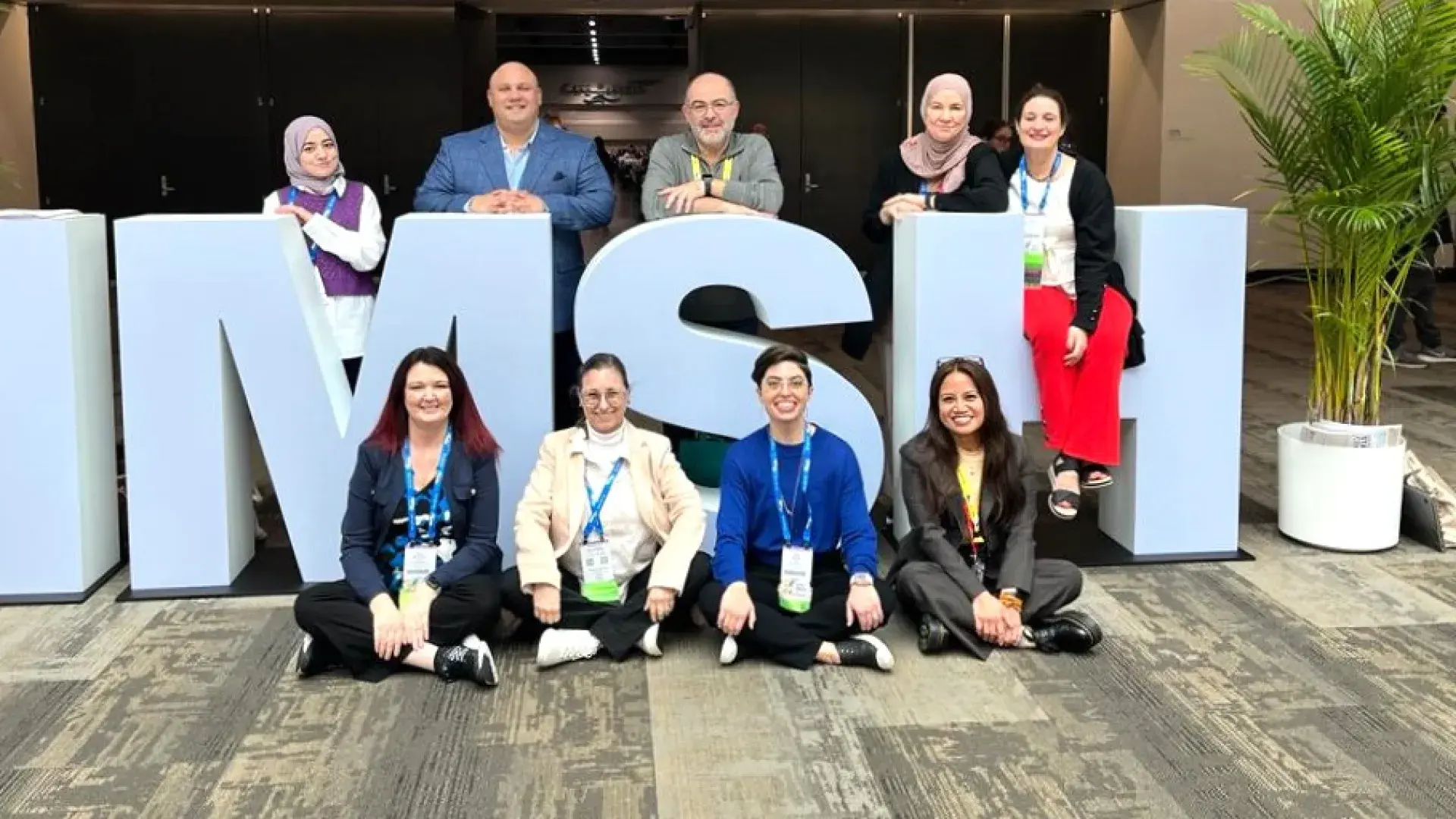
The Department of Health Professions Education was well represented at the Society for Simulation in Healthcare’s International Meeting on Simulation in Healthcare, held January 20-24 in San Diego, Calif.
Seven faculty members and 10 students gave 49 presentations during the scientific conference that explores the latest innovations and best practices in healthcare simulation and provides the tools and resources healthcare professionals need to advance their skills, impact change in delivery systems and practice, and, ultimately, to improve patient safety.
In addition, master's student Adam Hockman was awarded at the conference a $10,000 Early-Career Research grant for his project "Using VR in training behavior with technicians who work with children with autism."
The MGH Institute presentations were:
Faculty
- Rami Ahmed, DO, MHPE, FACEP; Term lecturer/adjunct: “Essential technological competencies for distance/virtual simulation educators,“ “An opportunity to practice debriefing with good intention and cultural sensitivity with clips from “The Office,” “Debriefing the unthinkable: Phased separation of emotions and practice in simulation (PSEPS),” “Get ready simulationists: Implementing guidelines for distance simulation educators,“ “Speed mentoring: A networking event with leaders in healthcare simulation,“ “AI in simulation design: Workshop on the use of Chat GPT to develop a simulation scenario,“ “From script to screen: Crafting engaging written distance simulation scenarios,” “Psychological safety in distance simulation: Is that your boss behind you?“ “Addressing microaggressions in the clinical learning environment: A simulation-based approach.”
- Maria Bajwa, PhD, MBBS, MSMS, RHIT, CHSE; Term lecturer/adjunct: “Implementing culturally adapted pediatric emergency medicine curriculum through distance simulation using the virtual resuscitation room in Pakistan;“ “Lawshe’s Content Validity Index of the Clinical Cultural Competence Questionnaire for physician simulation educators,“ “Essential technological competencies for distance/virtual simulation educators,“ “Get ready simulationists: Implementing guidelines for distance simulation educators,“ “Initiating, establishing, and sustaining research and training networks,” “Holograms, simulation and team training: What, where, why, and how? “ “Translating code of ethics into another language: Value and process,” “Incorporating concepts of diversity, equity, and inclusion in simulation.”
- Suzan Kardong-Edgren, PhD, RN, ANEF, CHSE, FSSH, FAAN; Associate Professor: “Implementing Culturally Adapted Pediatric Emergency Medicine Curriculum Through Distance Simulation,” “Using the Virtual Resuscitation Room in Pakistan,” “Lawshe’s Content Validity Index of the Clinical Cultural Competence Questionnaire for physician simulation educators,” “Using Lawshe’s Content Validity Index for Validity Evidence of Tool in Simulation based Education,” “Dissemination in the 21st century: Opportunities and pitfalls,” “Simulation-based Assessment of Nursing Entrustable Professional Activities (EPAs) from Inception to Validation,” “What Evaluation Tool Should I Use?! Considerations for Choosing Evaluation Tools for Simulation-Based Education,” “SSH Presents: New 2024 Virtual Scholars Initial Course (By Invitation Only),” “SSH Presents: Virtual Scholars Class of 2023 Research Projects Presentations.”
- Hani Lababidi, MD, PhD, FCCP, FSSH; Adjunct Associate Professor: “Get Ready Simulationists: Implementing Guidelines for Distance Simulation Educators,“ “Understanding Adverse Events through Integration of Human Factors in Simulation-based Training,“ “Simulation-based Assessment of Nursing Entrustable Professional Activities (EPAs) from Inception to Validation,“ “From Script to Screen: Crafting Engaging Written Distance Simulation Scenarios.”
- Cynthia Mosher, MD, PhD; Term Lecturer: “Get Ready Simulationists: Implementing Guidelines for Distance Simulation Educators,” “From Script to Screen: Crafting Engaging Written Distance Simulation Scenarios,” “Psychological Safety in Distance Sim: Is That Your Boss Behind You?”
- Janice Palaganas, PhD, RN, NP, ANEF, FNAP, FAAN, FSSH; Professor: “Reflection on Reflection: Developing Your Feedback, Debriefing, and Mentoring Abilities,“ “Essential Technological Competencies for Distance/ Virtual Simulation Educators,“ “Get Ready Simulationists: Implementing Guidelines for Distance Simulation Educators,“ “From Script to Screen: Crafting Engaging Written Distance Simulation Scenarios,“ “Psychological Safety in Distance Sim: Is That Your Boss Behind You? “ “SSH Presents: Healthcare Simulation Museum-Concept and Implementation.”
- Jill Sanko, PhD, ARNP, CHSE-A, FSSH; Adjunct Professor: “Initiating, Establishing, and Sustaining Research and Training Networks.”
Students
- Anne Weaver, PhD program: “Get Ready Simulationists: Implementing Guidelines for Distance Simulation Educators.”
- Britlyn Orgill, MS program: “SSH Anesthesia Section Presents: Advances in Simulation Education - A Panel Presentation,” “Harnessing DASH to Recognize and Categorize Debriefing Skills for Self and Faculty Development,” “Gold All Around You: Harnessing the Power of Trainees in Simulation Facilitation,” “Let's Make a Sim! 8 Easy Steps to Create a Learning Objective Focused Simulation.”
- Sadek Obeidat, MS program: “From Script to Screen: Crafting Engaging Written Distance Simulation Scenarios.”
- Sarah Neville, PhD program: “How Can We Know Learners Feel Psychologically Safe: Let's Assess It.”
- Anne Mullen, PhD program: “First Do No Harm: Strategies to Prevent Simulation Accidents”
- Melissa Morris, PhD program: “Get Ready Simulationists: Implementing Guidelines for Distance Simulation Educators,” “Holograms, Simulation and Team Training: What, Where, Why and How?”
- Sara Maaz, MS program: “From Script to Screen: Crafting Engaging Written Distance Simulation Scenarios.”
- Steve Lichtenberg, MS program: “Modality Pitch Room - Make Your Case,” “Back to Basics: A Beginners Introduction to Moulage,” “SSH Education Committee Presents: Fundamentals in Simulation - Moulage Basics/Intro to Manikin Maintenance.”
- Adreinne Galbraith, PhD program: “Empowering youth in underserved areas: Utilizing escape room simulation for healthcare professions recruitment.”
- Heather Epps, PhD program: “Integrating an educational electronic health record (EdEHR) into undergraduate nursing curriculum,” “How can we know learners feel psychologically safe: Let’s assess it,” “Intersectoral collaboration for the development of an open-source educational electronic health record for undergraduate nursing.”
